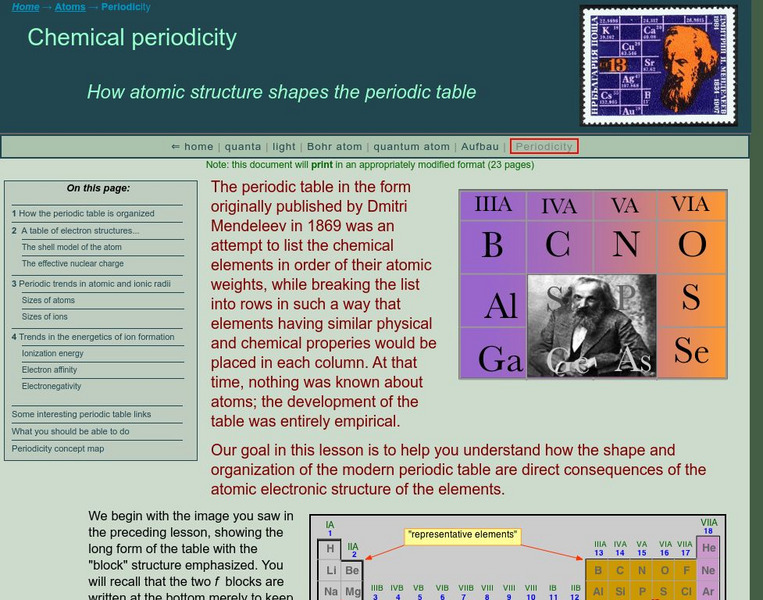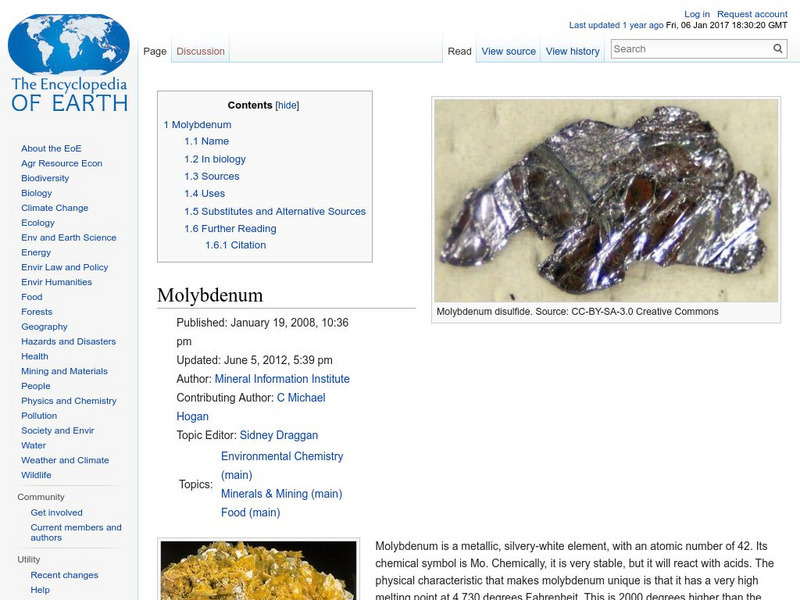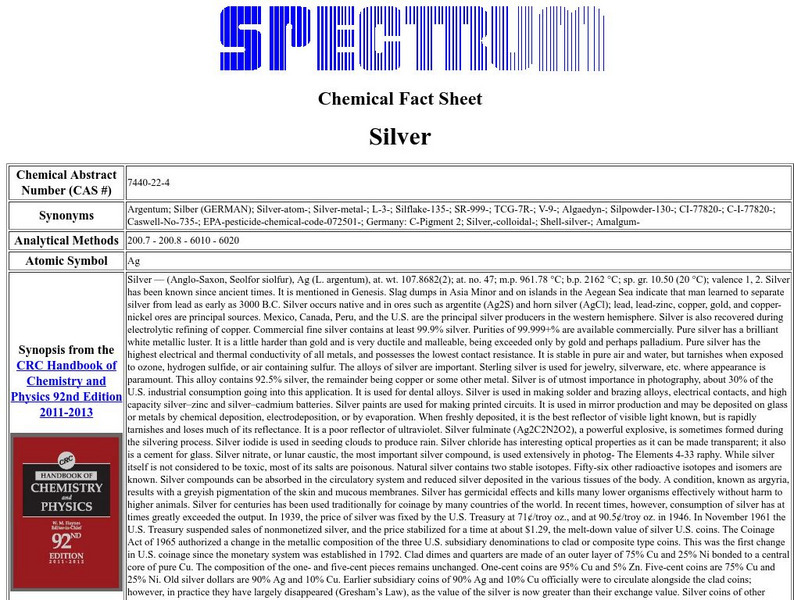CK-12 Foundation
Ck 12: Trends in the Periodic Table
[Free Registration/Login may be required to access all resource tools.] Students investigate specific properties that can be predicted by an element's position on the periodic table. Additionally, they will look at the formation of ions,...
Science Struck
Science Struck: Metalloids in the Periodic Table
Discusses the history and organization of the periodic table, where the metalloids fit in, and their properties. Includes color-coded periodic table of elements.
TED Talks
Ted: Ted Ed: Erbium: Periodic Table of Videos
The team at periodicvideos has created a TED-Ed Lesson for every element of the periodic table. In this one, the professor explains why erbium is perhaps the most important element for websites like YouTube. [5:35]
TED Talks
Ted: Ted Ed: Tellurium: Periodic Table of Videos
The team at Periodicvideos has created a TED-Ed Lesson for every element of the periodic table. This one is about tellurium, an element used more often in laser optics than any other in the chemical industry.
TED Talks
Ted: Ted Ed: Ytterbium: Periodic Table of Videos
The team at periodicvideos has created a TED-Ed Lesson for every element of the periodic table. What better way to talk about Ytterbium than by doing it from the very place it was discovered - Ytterby in Sweden! [3:36]
Utah Education Network
Uen: The Periodic Table and the Universe
Students will apply the atomic number of elements on the periodic table to the origin of heavy elements in the star cycle.
BBC
Bbc: Gcse Bitesize: Predicting Chemical Reactions
This lesson focuses on predicting chemical reactions using The Group 1 elements in the Periodic Table are known as the alkali metals. They include lithium, sodium and potassium, which all react vigorously with air and water. It provides...
Encyclopedia of Earth
Encyclopedia of Earth: Hydrogen
Information about the first element on the periodic table, Hydrogen, atomic number 1. Covers its history, sources, physical and atomic properties, places it occurs naturally on the Earth and in space, its many uses, and forms in which it...
Simon Fraser University
Chem1 Virtual Textbook: The Shell Model of the Atom
Acting as a subtopic of the General Chemistry Virtual Textbook's section on Atoms and the Periodic Table, this site discusses the properties of the atoms individually in relation to the main group elements of the Periodic Table.
Famous Scientists
Famous Scientists: Glenn Seaborg
Learn about Glenn Seaborg, the man who took part in the discovery of ten of the periodic table's chemical elements, and was awarded the Nobel Prize in Chemistry in 1951.
Cosmo Learning
Cosmo Learning: Chemistry 1 A: General Chemistry
A collection of video lectures from a general chemistry course taught at the University of California, Berkeley. The course covers topics like stoichiometry, acid-base and solubility equilibrium, oxidation-reduction reactions, chemical...
Alabama Learning Exchange
Alex: "Electron" Ic Battleship
The students will play a game of Battleship on the Periodic Table to review electron configuration of the elements.This lesson plan was created as a result of the Girls Engaged in Math and Science University, GEMS-U Project.
Other
Atoms in Motion: All Matter Is Made of Atoms
Atoms are very, very small. Atoms are so small that it is often said that there are as many atoms in a single grain of sand as there are grains of sand on all of the world's beaches - certainly a difficult thing to prove, but you get the...
Other
Especial Gas Inc.: Sulfur Properties and Compounds
This page from Especial Gas Inc. contains some very interesting information about the element sulfur, and some of its common compounds. The history and relative abudance of the element is discussed, as well as where it can be found. The...
Encyclopedia of Earth
Encyclopedia of Earth: Nitrogen
Information about the element, Nitrogen, atomic number 14. Covers common chemical transformations, its physical properties, atomic properties, how abundant it is on the Earth, and details about health-related regulations. Also discusses...
Encyclopedia of Earth
Encyclopedia of Earth: Molybdenum
Information about the metallic element, Molybdenum, atomic number 42. It is unique in having an extremely high melting point. Covers its discovery, its biological importance, its physical and atomic properties, how abundant it is on the...
Encyclopedia of Earth
Encyclopedia of Earth: Lead
Information about the heavy metal, Lead, atomic number 82. Gives some interesting historical details about lead's use in the past. Covers physical properties, atomic properties, how abundant it is on the Earth, and details about...
Encyclopedia of Earth
Encyclopedia of Earth: Physics & Chemistry: Calcium
Information about the element, Calcium, atomic number 20. Covers physical and atomic properties, sources, its role in geochemical cycles, how abundant it is on the Earth, its isotopes, some compounds of calcium, and its importance to...
Florida-Spectrum Environmental Services
Florida Spectrum: Chemical Fact Sheet: Silver
This site provides elemental information which may not be found in many other sites. Here you can find historical information, common uses and even the approximate going price for a gram of the element.
Simon Fraser University
Chem1 Virtual Textbook: Electronegativity
Acting as a subtopic of the General Chemistry Virtual Textbook's section on Atoms and the Periodic Table, this site discusses shared chemical bonds between two elements resulting in electronegative and electropositive outcomes.
















